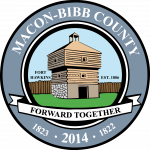On March 21, Macon-Bibb County and the Bibb County School District co-hosted a Vendor Fair at the new Tubman African American Museum as part of ongoing outreach efforts to the business community through the Office of Small Business Affairs. More than 100 representatives from local, regional, small, minority, women, and disadvantaged business owners attended the event to learn more about how to do business with government agencies.
The Vendor Fair was a chance for business owners to learn about the process, procedures, and policies related to bidding and awarding contracts, as well as hear about upcoming projects. Vendors also had the opportunity to set up tables presenting their goods, supplies, and services they provide. Representatives from Macon-Bibb, the District, Middle Georgia State College, Macon Housing Authority, Macon Water Authority, University of Georgia Small Business Development Center, and the Georgia Tech Procurement Assistance Center were on hand to meet one-on-one with businesses.
This Vendor Fair also featured a business leader’s roundtable panel discussion by business owners that have been successful with the procurement process and who have been awarded government contracts. Business owners also were given the chance to register with the agencies as a local, small, minority, and disadvantaged business so they would be properly recognized as such in the bidding process.
Business Definitions
Small Disadvantaged Businesses
The Small Business Administration defines Small Disadvantaged Businesses generally as those that generally meet the following criteria:
- The firm must be 51% or more owned and control by one or more disadvantaged persons;
- The disadvantaged person or persons must be socially disadvantaged and economically disadvantaged; and
- The firm must be small, according to SBA’s size standards
Small Business
The Small Business Administration defines a small business as one that is independently owned and operated, is organized for profit, and is not dominant in its field. Depending on the industry, size standard eligibility is based on the average number of employees for the preceding twelve months or on sales volume averaged over a three-year period. Examples of SBA general size standards include the following:
- Manufacturing: Maximum number of employees may range from 500 to 1500, depending on the type of product manufactured.
- Wholesaling: Maximum number of employees may range from 100 to 500 depending on the particular product being provided.
- Services: Annual receipts may not exceed $2.5 to $21.5 million, depending on the particular service being provided.
- Retailing: Annual receipts may not exceed $5.0 to $21.0 million, depending on the particular product being provided.
- General and Heavy Construction: General construction annual receipts may not exceed $13.5 to $17 million, depending on the type of construction.
- Special Trade Construction: Annual receipts may not exceed $7 million.
- Agriculture: Annual receipts may not exceed $0.5 to $9.0 million, depending on the agricultural product.
Socially Disadvantaged Individuals
The Small Business Administration defines socially disadvantaged individuals as those who have been subjected to racial or ethnic prejudice or cultural bias because of their identity as members of a group. Social disadvantage must stem from circumstances beyond their control. In the absence of evidence to the contrary, individuals who are members of the following designated groups are presumed to be socially disadvantaged:
- Black Americans/African Americans;
- Women;
- Disabled;
- Disabled Veterans;
- Hispanic Americans;
- Native Americans; and
- Asian Pacific Americans.
About the Office of Small Business Affairs
The Office of Small Business Affairs programs apply to all contracts for the purchase of construction-related services, professional services, goods, real estate development, renovation, maintenance or other services awarded by or on behalf of Macon-Bibb County, GA.
The Office of Small Business Affairs provides the following scope of services for local (within the jurisdiction of Macon-Bibb County, GA) owners of small businesses, minority business enterprises, women business enterprises and disadvantage business enterprises:
- Technical assistance for compliance to the RFP/RFQ and bid process;
- General education and training about opportunities to compete for county contracts and the RFQ/RFP and bid process;
- Outreach to Small Business Enterprises, MBE, WBE, and DBE;
- Advocacy for Small Business Enterprises, MBE, WBE, DBE;
- Maintenance of a current registry of Small Businesses, MBE, WBE, DBE; and
- Small business, MBE, WBE, DBE local certification.
Vision
The vision of the Office of Small Business Affairs is to have equity in local city-county government business opportunity.
Mission
The mission of the department is to develop and coordinate inclusive programs to promote the growth of small businesses, minority business enterprises, women business enterprises and disadvantage business enterprises. The Office supports the enhancement of the economic well-being of the county by providing resources that will improve the competitiveness of these businesses within the RFQ/RFP and bid process. The office also promotes and supports small business development and workforce development.
Core Values
The core values of Equity, Professionalism, Integrity, and Competitiveness undergird the ethos of the Office of Small Business Affairs.

